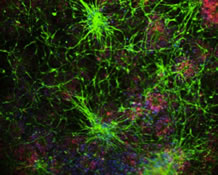Columbia University
Irving Medical Center
Neurological Institute
710 West 168th Street, 3rd floor
(212) 305-1818
Featured Research
Collaboratory on Research
Definitions for Reserve and
Resilience in Cognitive Aging
and Dementia
» Collaboratory on Research Definitions for Reserve and Resilience in Cognitive Aging and Dementia
» Center of Excellence for Alzheimer's Disease (CEAD) at Columbia University Irving Medical Center
» 9th ANNUAL TAUB INSTITUTE RESEARCH RETREAT, November 2018
» Columbia University Alzheimer's Disease Research Center (ADRC) 2018-19 Pilot Grant Awardees
» 8th ANNUAL TAUB INSTITUTE RESEARCH RETREAT, November 2017
» Qolamreza R. Razlighi, PhD: Quantitative Neuroimaging Laboratory
» Sandra Barral Rodriguez, PhD
» Catherine L. Clelland, MS, PhD
» 7th ANNUAL TAUB INSTITUTE RESEARCH RETREAT, October 2016
» Badri N. Vardarajan, PhD, MS
» Dr. Yaakov Stern: the Concept of Cognitive Reserve
» The Alzheimer's Disease Research Center at Columbia University Celebrates 25 Years
» Lawrence S. Honig, MD, PhD, FAAN
» 6th ANNUAL TAUB INSTITUTE RESEARCH RETREAT, October 2015
» Ismael Santa-Maria Perez, PhD
» 5th ANNUAL TAUB INSTITUTE RESEARCH RETREAT, October 2014
» Yaakov Stern, PhD: Cognitive Neuroscience of Aging Laboratory
» Michael Shelanski Laboratory
» Richard Mayeux, MD, MSc: Laboratory for Genetic Epidemiology
The three-year, National Institute of Aging-supported Collaboratory on Research Definitions will provide a platform for the exchange of ideas on definitions for the concepts of Reserve and Resilience and related terms. Here, Collaboratory Chair Dr. Yaakov Stern provides some background and insight into the project aims ahead of hosting the
1st Workshop on Reserve & Resilience in Cognitive Aging and Dementia
this September 9-10, 2019 in Bethesda, MD. Click Here to Register.
Dr. Yaakov Stern (YS), please give us some background on this exciting new project!
Who else is involved in this Collaboratory?
The support for the Collaboratory comes from the National Institute of Aging, which put out a request for applications that detailed most of the features of the project. To help plan this project, I tried to enlist a set of investigators who are active in the area, represented both human and animal research, and had diverse opinions. We needed to translate the general guidelines of the request for application into an actual action plan.
The overall goal is to develop operational definitions, research guidelines, and data sharing platforms with consensus and assistance from the research community. We will hold three cross-discipline workshops to bring together investigators to discuss and come to consensus on these concepts, and create focused work groups that will examine each of these issues. The first of these workshops will take place this September 9-10, in Bethesda, MD.
What is your plan for this 1st Annual Reserve & Resilience Workshop?
What do you expect from this initial event?
Please tell us more about the aspects of the program?
One intriguing resource that we developed in response to the original request for applications is a repository where large data sets can be shared and analyzed, to facilitate collaborative research. It will be interesting to see what will be done with this. Finally, one strong goal is dissemination. We have an established website, https://reserveandresilience.com, where all of the talks and slides will be posted. We anticipate writing reports and papers describing the process and outcomes of the first meeting.
What excites you about this project?

